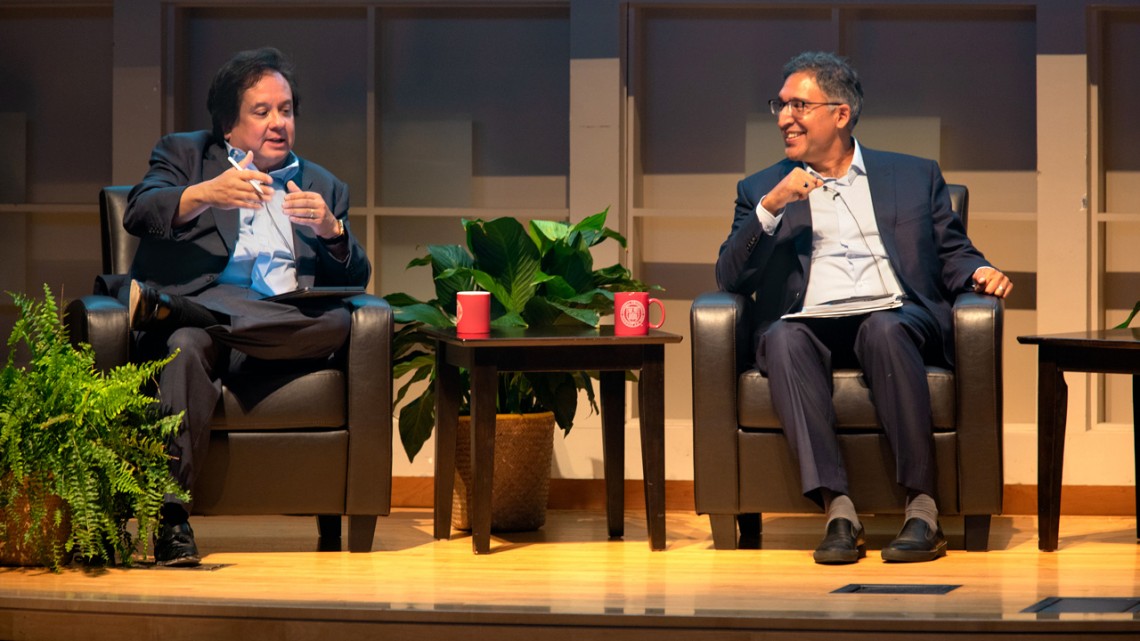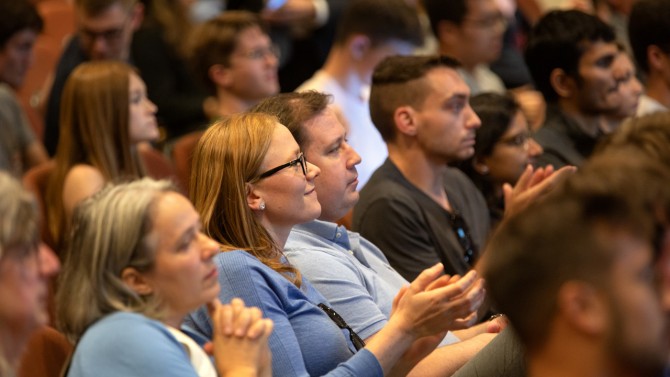
George Conway, left, and Neal Katyal discuss executive power during the first event in the Peter ’69 and Marilyn ’69 Coors Conversation Series Sept. 17 in the Statler Auditorium.
Legal experts: Checks and balances needed on executive power
By James Dean
The 2020 election could determine whether an imperial presidency gains strength or if the nation finally reins in a decadeslong expansion of executive power, a pair of legal experts said Sept. 17 at Cornell.
“Whether it’s in four years or 12, I actually think executive power is going to be dramatically curtailed, because we’ve had such abuses in the last four years,” said Neal Katyal, a Georgetown University law professor, partner at law firm Hogan Lovells and former acting solicitor general in the Obama administration.
George Conway, a lawyer in the litigation department of the New York law firm Wachtell, Lipton, Rosen and Katz, and spouse of close Trump aide Kellyanne Conway, said that whoever is elected, the executive branch would always have a tendency to seek more power.
“The framers were fearful of the legislature, and today I think they would fear the executive [branch],” he said.
Discussing executive power in the Statler Auditorium on Constitution Day, Katyal and Conway kicked off the first event in the Peter ’69 and Marilyn ’69 Coors Conversation Series. The series aims to bring high-profile experts with differing political perspectives to the Ithaca campus to foster civil discourse on challenging issues.
“This new series is premised on the idea that universities are ideal places to think and talk about contentious questions, and to challenge our own assumptions about them,” said Eduardo Peñalver ’94, the Allan R. Tessler Dean of Cornell Law School. “Tonight’s conversation on executive power could not be more timely, not only because of controversies in this country, but also around the world.”
President Donald Trump has sparked controversy over alleged abuses of executive power, such as his travel ban affecting several predominantly Muslim countries, which Katyal, representing the state of Hawaii, argued against in the U.S. Supreme Court. Other examples include funding construction of a border wall without approval from Congress, claiming a national emergency; assertions that he cannot obstruct justice or be indicted; and threatened prosecutions of political opponents.
“In terms of the muscular assertion of constitutional authorities he’s asserting, it’s unlike anything in our lifetimes, it’s unlike anything that I think the country has seen before,” Katyal said.
Conway, a member of the conservative Federalist Society who is also sharply critical of Trump, said the problem of expanded presidential power long predates and will long survive the 45th president.
Trump’s border wall funding, Conway argued, was a “mirror image” of former President Barack Obama’s overreach in using an executive order to protect from deportation some immigrants brought to the United States as children, referred to as “Dreamers.”
While such actions appear to flex presidential might, Conway said Trump’s border wall strategy was “a reflection of extreme weakness” politically.
Both lawyers lamented presidents’ use of military force without declarations of war or congressional approval, sometimes citing powers bestowed many years before, as with an authority to strike terrorists granted after 9/11.
Conway said Trump’s air strikes on Syria were less extensive than Obama’s strikes on Libya or the Clinton administration’s 78-day, NATO-led campaign in Kosovo. Administrations have justified their actions legally after the fact, sometimes pointing to Congress’ eventual funding of the operations as evidence of its support.
What’s the solution if you believe that Congress – not just a president – should sign off on most military actions?
Congress “should be showing some spine,” Conway said, by updating the War Powers Resolution of 1973 and modifying the Authorization for Use of Military Force, passed in September 2001. That would force debates and votes on a president’s ability to launch air or drone strikes – votes the executive branch might lose.
“But, hey, that’s life in a democracy – sometimes the president doesn’t get to do what he wants to do,” said Conway. “That’s the way it’s supposed to work.”
Unfortunately, Katyal said, a polarized Congress is unlikely to take those steps. As a result, he said, change must start within the executive branch itself: The next president should ask Congress to approve uses of force, and also encourage internal checks and balances within their administration. One such example, Katyal said, was the CIA’s formation of “red teams” to challenge leadership’s thinking after 9/11.
An audience member asked what could be done if a leader came along who was not politically weak, as Katyal and Conway claimed Trump is, but highly effective at asserting executive power for similar ends.
“The ultimate check on that,” Conway said, “is at the ballot box.”
After November 2020, he suggested, Congress might at minimum reconsider under what circumstances presidents can claim national emergencies.
Katyal called the question a hopeful one, highlighting the opportunity for Americans, whether they like a president or not, to reassess how much power one person should wield.
“This is not about politics, this is about constitutional structure, and where the lines of authority need to be that our founders gave us, which was a system truly of checks and balances,” he said. “What happened to them?”
Sarah Kreps, professor of government and adjunct professor of law, moderated the hourlong conversation. Afterward, members of the Cornell Political Union hosted a discussion about the program and shared their views on executive power.
The conversation series resumes Oct. 3 with Ezra Klein, editor-at-large at Vox.com, and conservative journalist and author Andrew Sullivan considering whether illiberalism is corroding American democracy. The event starts at 6:30 p.m. in the Law School’s Landis Auditorium.
Media Contact
Get Cornell news delivered right to your inbox.
Subscribe
